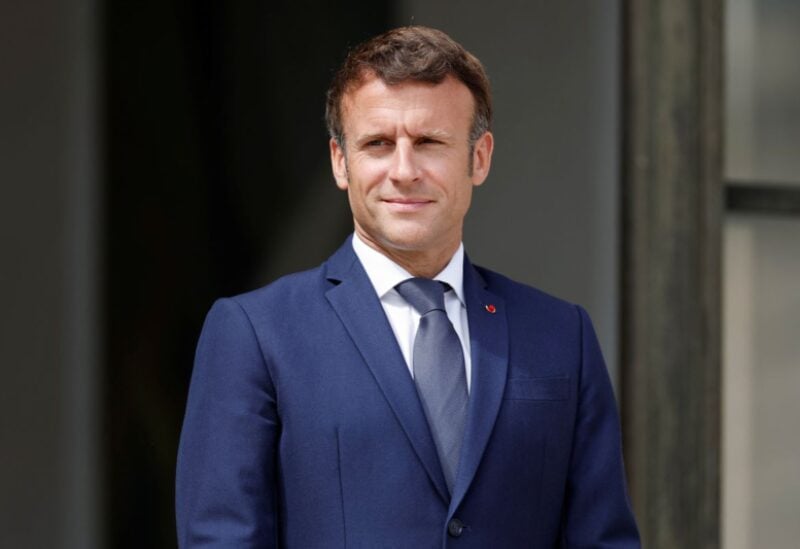
French President Emmanuel Macron welcomes a guest at the Elysee Palace in Paris, France, June 10, 2022. REUTERS/Benoit Tessier
The visit of Saudi Crown Prince Mohammed bin Salman to Paris, comes at the official invitation of French President Emmanuel Macron, and carries a common will to push partnership to broader horizons.
Since Emmanuel Macron’s accession to the presidency in the spring of 2017, he has shown great interest in foreign policy.
During the five years of his first term, the French president made great efforts on issues of the European Union, calling for more integration and “strategic independence” of the union, and seeking distinguished relations with former US President Donald Trump and Russian President Vladimir Putin.
Macron was also active in the Middle East, but success was not often his ally, as we have seen in the Lebanese situation. His efforts also focused on Libya, Sudan and Iraq, as well as the fight against terrorism, the African Sahel region and the Mediterranean basin, and the large number of international conferences that he called for.
After the shock he received in the last legislative elections, in which his coalition failed to obtain an absolute majority in Parliament, Macron undoubtedly wants to show that he is still effective on the international stage.
But what are the current goals and expectations of Paris from its endeavor to strengthen its relations with Saudi Arabia? There is a great French interest in reaching an understanding with Riyadh, in light of the energy crisis and its repercussions on the French consumer, a rise in the prices of petroleum products and electricity, in addition to the wave of inflation and the deterioration of the purchasing power.
Macron is seeking a dialogue with Prince Mohammed bin Salman on energy, clean energy and nuclear energy issues. The French president wants, as his sources said on Thursday, to be the spokesperson of the European Union in his talks with the Saudi Crown Prince.
Middle East and Arab world Researcher Agnes Levallois, said that Paris had a tripartite interest in strengthening its partnership with Riyadh, within the framework of “France’s desire to have a role in a region that is going through a very complex stage.”
Several French sources revealed that Macron – who refers in all his interventions on the Gulf region to the need to maintain security and stability – was concerned about the phase that would follow the possible failure of efforts to return to the nuclear agreement with Iran.
The Vienna negotiations have not yet led to a result, and the exchange of accusations between Washington and Tehran do not point to a desire to reach a final agreement. Therefore, Macron is considering the possibility of calling for a regional-international meeting similar to the Baghdad conference, under French-international auspices, before the end of this year. Undoubtedly, such a meeting would have no meaning and impetus without Riyadh’s participation.
On Thursday, sources in the Elysée said that discussions were underway over the conference that could be hosted by Jordan, adding that nothing was final yet.
Other analysts noted that French diplomacy could play a role with the presence of an “opportunity” to re-launch the Israeli-Palestinian peace negotiations that have been stalled since 2014, knowing that Macron was absent from this matter during his first term.
Agnes Levallois added that the French president needed the cooperation of Prince Mohammed bin Salman in the Lebanese file, because of his fear of an institutional vacuum if the presidential elections do not take place on their scheduled date, and in the absence of an effective government.
Francois Touazi, vice chairman of the MEDEF International France-Saudi Arabia Business Council, said that Prince Mohammed bin Salman’s visit “reflects the depth and solidity of the relationship between the two countries.”
The two sides have always been able to rely on one another, “which enabled them to consolidate this multi-dimensional partnership in security, defense, economics, education and culture,” he underlined.
In remarks to Asharq Al-Awsat, Touazi noted that the Russian-Ukraine war “makes the deepening of dialogue and cooperation between the two parties necessary in order to confront the consequences of this conflict and work together to develop solutions to get out of the crisis.”
He added that Saudi Arabia’s ambitious Vision 2030, which will allow diversifying sources of income by boosting new development sectors, was an opportunity to strengthen the economic partnership with France, which ranks third among foreign investors in the Kingdom.
French companies, which are present in various sectors in Saudi Arabia, including defense industries, renewable energy, health, transportation, tourism and entertainment, benefit from the great openness and the ambitious reforms adopted by the Kingdom.